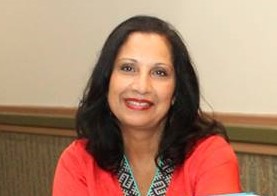After years of COVID quarantine and public quiet, people are yearning to resume the normal activities of life, both as families and as communities. One such desire is to treasure the culture legacies one has been blessed with. Pakistani Americans are lovers of poetry, music and art. In particular, the love of the Urdu language is a passion for many, and any opportunity to bathe in its beauty is sought after.
Yesterday afternoon, we were able to help out and attend such an event. The team of young Pakistani Americans led by Kalsoom Kazmi – founder of Brilliance Foundation – put together an affair titled “Urdu Adab and Chai”, and my husband Shahid Akhtar was a semi- MC for the event. About 120 people gathered in the Muslim Community Center in Paramus, NJ, which is another achievement by the younger professional generations that want to treasure our spiritual traditions of Islam, while opening a community center that is open to all.
For us senior activists, it was a pleasure to sit back and enjoy the younger generations taking the lead of these events, and in particular to hear young American born poets recite their own poetry; displaying their art or even reciting well-known poetry. The Pakistani Consul General Ayesha Ali, the newly elected NJ Assemblywoman Shama Haider were also in attendance, especially as the focus of Brilliance Foundation is women and girls development in all spheres of life. This year’s honored guest was Parvin Shere, an amazing artist, poet and musician (www.parvinshere.com), who moved us all with her poems presentation. I presented my sister Sabah Farooq’s art reprints as gifts for all the honored guests, and next year Sabah will be a featured artist as well. Some of the older generations habits still persist, such as not staying on time, lengthy presentations and verbose introductions, but overall it was an amazing feat as it creates a platform for the next generation to embrace, integrate and even develop their indigenous culture while developing leadership and communications skills.
What is Urdu? Urdu is the national language of Pakistan, and has many roots, such as Arabic, Turkish, Sanskrit, Persian. Under the Moghul rule of India, it was the court language and developed into an art form that to this day can have people swoon and sway in its beautiful rendition, wit and depth. As most Easterners – from Morrocco to India and China have ancient oral traditions, this is another derivative of the ancient art of reciting poems, stories and plays as a performance art; but Urdu has a particular closeness to Farsi, the language of Iran or Persia (in ancient times). In fact, my mother learned Farsi when she was in school, and many of the Indian poets also wrote in Farsi, such as Allama Iqbal.
I like the combination of Urdu, Adab and Chai as it adds the word Adab- which can mean manners, cultural sophistication or even literature- and Chai which refers to the ritual of tea . While coffee denotes an invitation to meet and talk in American culture, chai is even beyond the lingering capuccino ritual in Italy – it is a ceremony in itself with etiquette and expectations around it, although not as formalized as the Asian tea ceremonies. Poems and songs romanticize it like they romanticize rain or many other things in the East, which is sweet. What is the most fun part is that the object is not the tea itself, but the relationships and ambiance that are created. Congratulations to the Brilliance Foundation on a lovely event honoring arts and culture and chai!

Be First to Comment